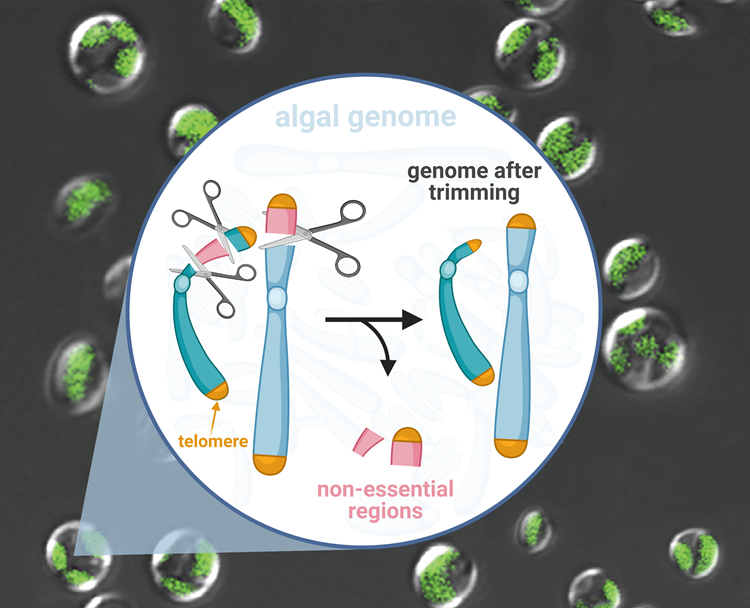[Summary] A single-celled algae hasundergone genome surgery to remove non-essential parts. This can lead to a most efficient cellular factory for producing sustainable biofuels from sunlight and carbon dioxide.
Researchers have stripped hundred-kilobase genomefroma type of oil-producingmicroalgae, knocking out genes non-essential for it to function. By doing so, they have created a "genome scalpel"that can trim microalgal genomes rapidly andcreatively. The ‘minimal genome’ microalgaeproducedis potentially useful as a model organism for further study of the molecular and biological function of every gene, or as a 'chassis' strain for synthetic biologists to augment for customized production of biomolecules such as biofuels or bioplastics.
The study appears in The Plant Journal on Mar 14th, 2021.

Hundred-kilobase fragment deletions in microalgae by Cas9 cleavages. Created with BioRender.com.
(Image by LIU Yang)
Creation of a'minimal genome'—a genome stripped of all duplicated or apparently non-functional 'junk genes'—can be very useful for investigating fundamental questions about genetic functionand for designing cell factories that produce valuable compounds. Stripped down to only what is essential for survival allows researchers to then build on and test new functionality. Alternately, minimal genomes can serve as a basic ‘chassis’ upon which synthetic biological organism can be built.
Such minimal genomes have been created for simple organisms, but rarely for eukaryoticorganisms (all those species whose cells have a nucleus), including algae or plants, due to their large size and sheer complexity. In higher eukaryotes, "junk" regions can take up to 70 percent of the genome. But deleting what only appear to be junk genes but in fact are not can have harmful effects on the organism or even kill it.
For the first time, researchers with the Qingdao Institute of BioEnergy and Bioprocess Technology (QIBEBT) of the Chinese Academy of Sciences (CAS) have produced a genome with targeted deletions, of hundred Kb in size each, for a type of algaecalled Nannochloropsis oceanica.
N. oceanica are microalgae (single-called algae) that have tremendous potential for production of biofuels, biomaterials and other platform chemicals in a renewable and sustainable manner while reducing greenhouse gas emissions. Unlike conventional production of biofuels (and other biomaterials), they would not compete with production of food for arable land. However, realizing the potential of these microalgae requires extensive genetic engineering of the organism to maximize yields and minimize production costs
The QIBEBT teamfirst identified the non-essential chromosomal regions—ones whose genes were rarely expressed, or activated. They identified ten such ‘low-expression regions’, or LERs. They then used CRISPR-Cas9 gene-editing technique to snip out two of the largest LERs—over 200 kilo bases in size.
"Despite the all snipping, the microalgae still showed essentially normal growth, lipid content, fatty acid saturation levels and photosynthesis," says study first-author WANG Qintao, of the Single-Cell Center (SCC) in the QIBEBT. "In some cases, there was even a slightly higher growth rate and biomass productivity than the organism in the wild."
"We interestingly found normal telomeres in the telomere-deletion mutants of Chromosome 30," says the corresponding author XU Jian, of the SCC, CAS. "This phenomenon implies the losing of distal part of chromosome may induce telomere regeneration."
Already, the substantially snipped genome should serve as a closer-to-minimal genome in Nannochloropsis, which can serve as the chassis strain for customized production of biomolecules using further metabolic engineering atop this chassis.
Now that they have proven they can successfully strip downthe genome ofsuch a complex eukaryote, the researchers now want to see if they can snip out still further LERs and other non-lethal regions,tocrafta fully minimal Nannochloropsis that makes biofuels from CO2 with the highest efficiency.